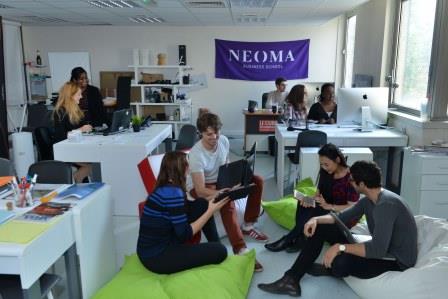‘Entrepreneurs across Borders’ A network of 10 incubators across the world

@NEOMAbs launches the first international network of incubators
In line with its long-held stance of basing its activities on a network of prestigious universities across the world, NEOMA is launching the first international network of incubators. This network comprises 10 institutions recognised for their expertise in entrepreneurship, and is part of the School’s new scheme ‘Entrepreneurs across Borders’.
From September 2020, students selected for this exceptional course will become part of the partner’s incubator, with six months of their course being devoted to the creation of a business.
Immersion into the international scene is at the heart of the DNA of NEOMA Business School, which is challenging the traditional academic exchange model by launching the first network of incubators at international level.
“This unique immersion model is reinventing the international experience of the student by anchoring it in the personal project of the student who wants to set up their start-up, while respecting the School’s conviction that an exchange is strongest when the students become part of the best universities in the country,” explains Delphine Manceau, Dean of NEOMA.
Entitled ‘Entrepreneurs across Borders’ this programme covers 4 continents and has 10 partner universities with the aim of promoting exchanges with local start-uppers.
“It is our ambition to create the first international entrepreneurial eco-system,” says Céline Davesne, Associate Dean for Programmes and International Affairs at NEOMA.
“To help us achieve this ambition, we are delighted to include among our partners several institutions renowned world-wide for their expertise in entrepreneurship, such as UC Berkeley in the United States, Deakin University in Australia, the Getúlio Vargas Foundation (FGV) in Brazil and IIM Calcutta in India.”
This scheme is aimed at students on the post-bac Global BBA and TEMA programmes as well as students on the Master in Management. They develop their business creation project over six months at the incubator of the partner university.
“By setting this unique scheme within the environment of Business Schools and Engineering Schools, our young start-uppers discover the best entrepreneurial practices, identify local business partners and develop their ideas more extensively,” analyses Denis Gallot, Director of NEOMA Startup Lab.
“It gives them a unique opportunity to set up start-ups that are international from the outset, within a ‘born global’ rationale.”
Depending on its sectors of activity, each partner university offers a comprehensive package to support the creation of a business: specialist teaching, personalised coaching, meetings with experts and local funders, participation in enterprise events, and more.
In return, NEOMA hosts students from the partner universities at its own incubators, in a mutually beneficial relationship to promote the exchange of good practice, feedback on experience and the sharing of knowledge.
Although the students must have a solid academic background and a good level of English to be able to benefit from this exceptional experience, the state of progress of the business creation project is not one of the criteria for selection.
“All projects are welcome, whether they are at a very early stage or already far advanced,” explains Denis Gallot.
“What makes the difference is more the ability to think big and not restrict their ideas to the French market alone.” The students selected will therefore join one of the three NEOMA incubators to help them define their market, the feasibility of their concept, and the viability of their business creation project, before they go abroad.











Responses